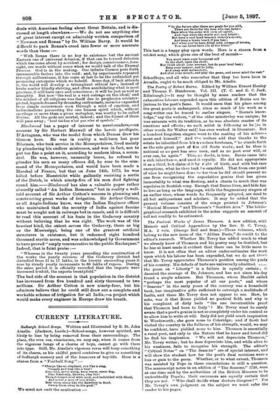The Poetry of Robert Burns. Edited by William Ernest Henley
and Thomas F. Henderson. Vol. III. (T. C. and E. C. Jack, Edinburgh.)—It may be thought by some readers that the exhaustive labours expended upon this edition of Burns are in- jurious to the poet's fame. It would seem that his place among the great poets is endangered, since so much of his work as a song-writer can be traced to earlier singers. " Burns's know- ledge," say the writers, " of the older minstrelsy was unique; he was saturate with its tradition, as he was absolute master of its emotions and effects ; no such artist in folk-song as he [so in other words Sir Walter said] has ever worked in literature. But a hundred forgotten singers went to the making of his achieve- ment and himself." And the writers add that thanks to the estate he inherited from his n vnele.ss forebears, " he stands forth as the sole great poet of Vie old Scots world; and he thus is national as no poet has ever been, and as no poet ever will, or ever can, be again." This, no doubt, is true. Burns came into a rich inheritance, and used it royally. He did not appropriate it as a thief, but claim,d it by rght of birth, and with but rare exceptions, what he thus took le ennobled. That from one point of view he might have done he ter than he did should prevent no one from recognising the superlative genius that has given immortality to what was fleeting, and a charm to much that was repulsive in Scottish song. Enough that Barns lives, and bids fair to live as long as the language, while the fragmentary singers of an earlier time, whose words he frequently adopted, are dead to all but antiquarians and scholars. It may be added that the present volume consists of the songs printed in Johnson's "Musical Museum " and Thomson's " Scottish Airs." The biblio• graphical research exhibited in the notes suggests an amount of toil not readily to be estimated.






































 Previous page
Previous page